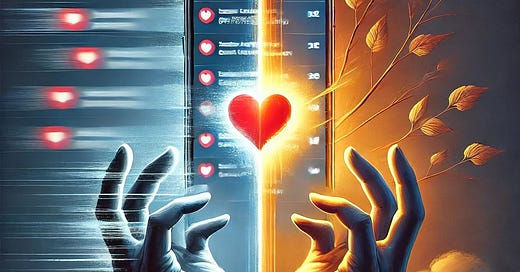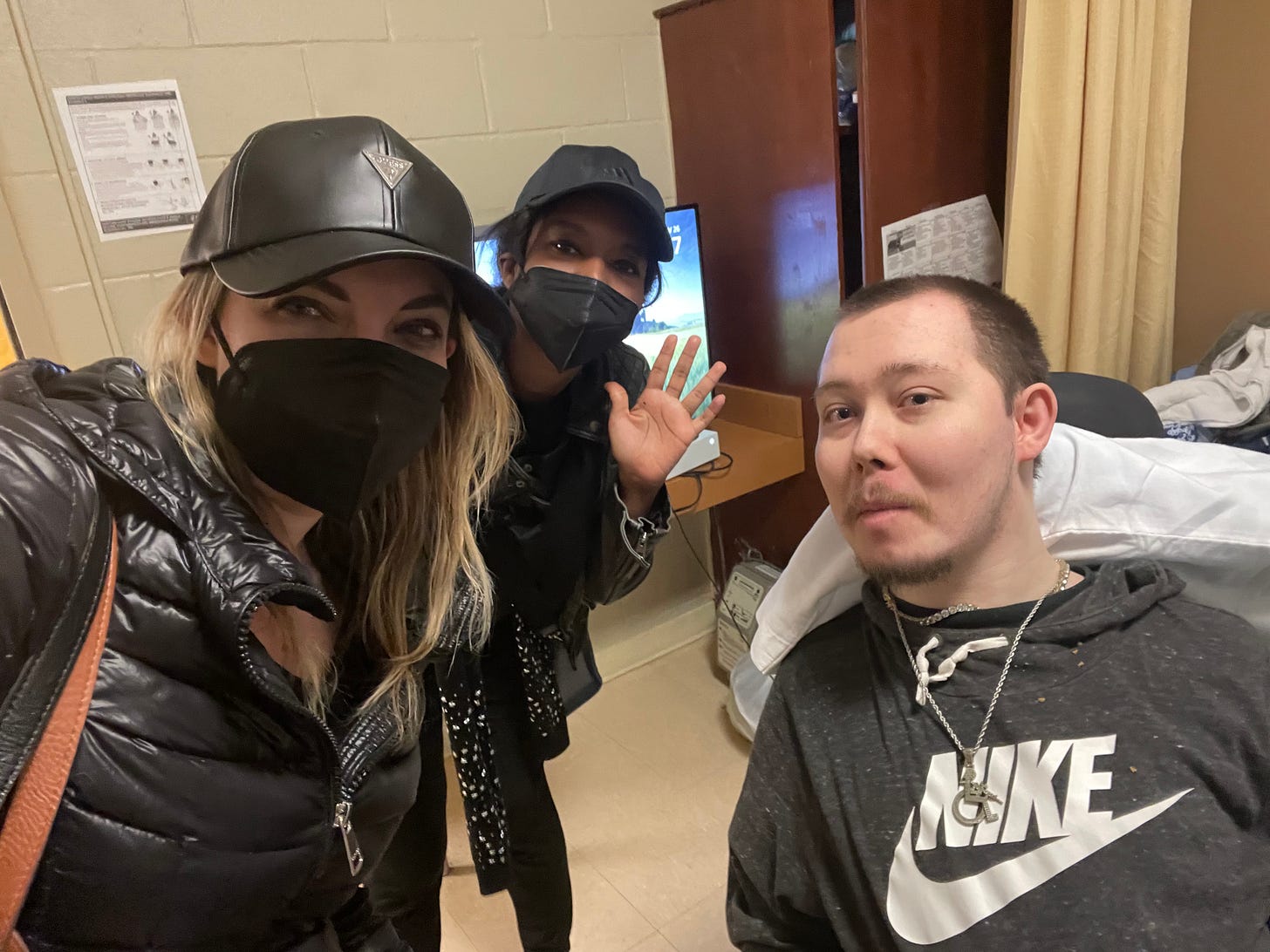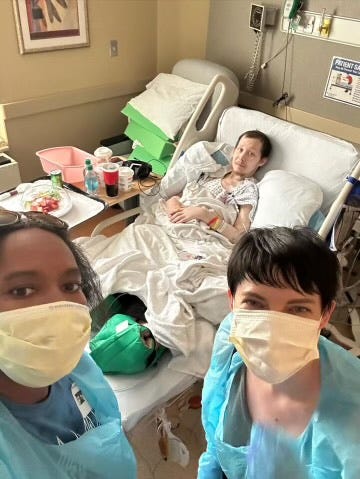The Quick Flash of Connection: How Social Media Is Making Authenticity Feel Fleeting
Reflections on Loss, Purpose, and the Search for Genuine Connection in a Digital World
Twenty years ago, I took a leap that would change my life forever. I flew from Maryland to California to meet Lauren, a girl I’d connected with on the internet a year earlier. Growing up in a small town, I often felt isolated. The internet became my escape—MySpace, Friendster, LiveJournal, and whatever dating sites I could find. It was on one of those now-defunct sites, Face the Jury, a face-rating site that I met Lauren. Today, we’re married and co-lead our business together.
It’s ironic. I found one of the most substantive human beings on the planet on arguably one of the most shallow and superficial websites ever to grace the internet. But maybe that’s what made it authentic. It didn’t pretend to be anything more than what it was—a place for quick judgments based on appearances. It wore its fakeness on its sleeve, and in that, there was an honesty that’s often missing in today’s curated glossy digital world.
My fascination with the internet and social media has grown, especially in the last four years. The pandemic accelerated our shift into the digital landscape—people were glued to their phones like never before. We were told that once things returned to a “new normal,” people would crave in-person interactions again. And sure, that’s true to some extent. But I’ve noticed something unsettling: as we’ve become more immersed in the digital world, the gap between online and offline has widened.
Take TikTok, for example, and the rapid pace of content consumption. It’s as if the depth of human connection is being compressed into a single post. A two-year relationship? Fold it into a 15-second video, post it, and then move on. A camera flashes, a memory is made, and then it’s forgotten as quickly as captured. I’ve had people imply—without actually saying it—that I should be moving on from the grief of losing Robert. It is as if the depth of my emotions is something to be quickly processed and set aside.
But Robert wasn’t just someone you could move on from. He lived in Maryland, my home state, and initially reached out to Lauren to be his girlfriend, then to me, because he was lonely. Rather than blocking or shutting him down, we noticed his situation, and each became friends. Imagine being in his shoes—paralyzed from the H1N1 vaccine as a teenager, living in poverty, and having no one to rely on. After the heart of the pandemic, our friendship became more than just an online connection; it became a bond. We talked every day, FaceTimed once a week, and even had digital movie nights. We began helping him financially because he literally had nobody else.
It’s like people can’t imagine being in that situation. I’ve never seen more people talk about being empaths in my life, yet I haven’t seen even a fraction of them try to put themselves in his shoes. The irony isn’t lost on me—I’m deep in the marketing, tech, and PR spaces, industries where empathy is often talked about but rarely acted upon.
When I shared that Robert had passed away, my Instagram story views tripled. A handful of kind souls reached out genuinely with words of support or contributed to the GoFundMe campaign we created to raise funds for his funerary expenses and his mother. I don’t expect everyone to contribute, but so many people who watched and didn’t are the same ones who regularly flash their lifestyles and brandish motivational memes from tired thought leaders like badges of honor. They couldn’t even DM, share the campaign, or contribute $5 because it didn’t click.
It could be that I’m mired in grief and frustration about Robert’s situation and deflecting a little bit on these people, but it’s not lost on me how even some of these watchers have been flaky in other areas of life. Why? Are they even in touch with it?
I’m not sure where I’m going with this other than to say I’m frustrated. Frustrated by the fakeness, by the performative nature of it all. Why can’t we just be ourselves? Why can’t we take meaningful action instead of just talking about it? The watching has become more pronounced, the fakeness more blatant, and I’m left wondering—what’s happening in everyone’s heads? Is there anything real behind those screens?
Two days after I learned Robert passed away, I pushed myself to write a 70+ page ebook, The Purposeful Marketer, about the importance of maintaining authenticity in marketing. People often think that "authenticity" and "being driven by purpose" are only intended for leaders of nonprofits and B Corps, but that couldn’t be farther from the truth. Venture-backed startups without intention or a strong culture are set up for failure—purpose means doing things with intention, in line with values and higher goals. Large enterprises, too, without purpose or an often changeable one, will eventually notice the decline. Look at WeWork—Adam Neumann seemed to have a purpose initially, but in reality, that purpose was shallow and entirely self-involved. In my book, I discuss how it is necessary to have some self-involvement, but it must align with your higher goals.
If there’s one thing Robert’s life and death have reinforced for me, it’s the power of real connection. If it weren’t for social media or the internet, I wouldn’t be married to my best friend and wouldn’t have had the blessing to know or help Robert. However, these interactions and opportunities were not passive. We didn’t just watch; we didn’t leave messages on ‘seen’; we acted. Social media is not "watching media." If you’re on social media and just watching, you’re missing the point. Interact. Engage. I always do, even if not every time I consume someone’s content, because passively watching does nothing for me or for the other person. It becomes toxic.
The internet is a tool—a powerful one—but it’s up to us to use it with intention, to forge genuine connections, and to act with purpose. If we do that, we can create something real, something lasting. If not, we’re just contributing to the noise.







It’s devastating how often people neglect their duty to nurture and support. I’ve spent years caring for those in difficult situations, often without the support of my own loved ones.